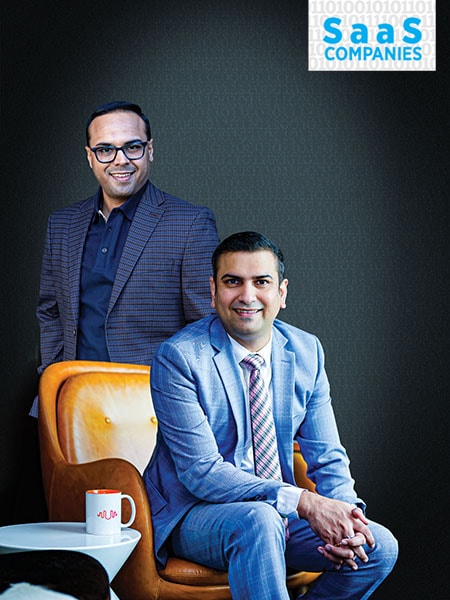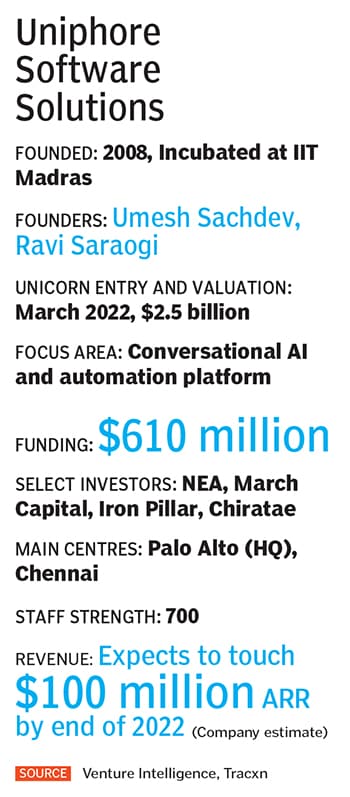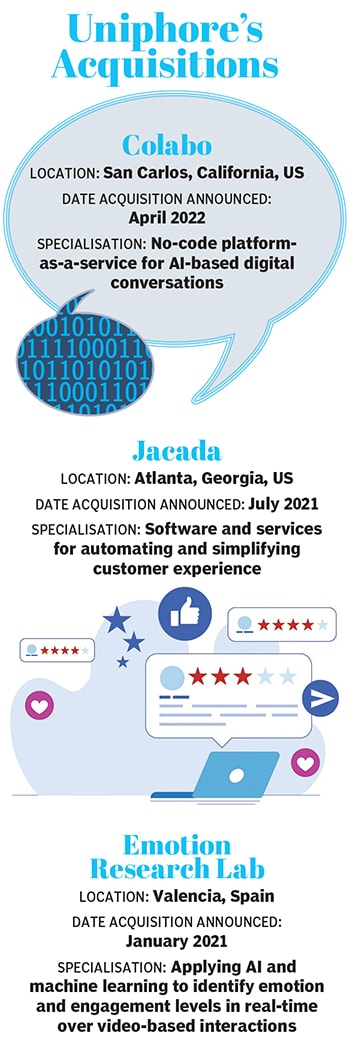
Uniphore: Building deep-tech conversational AI for the world
Uniphore has the vision of becoming the horizontal AI layer running across every organisation and every single conversation, including—not in the too distant future—in-person conversations
 Umesh Sachdev (standing), co-founder & CEO; Ravi Saraogi, co-founder & president APAC, Uniphore Solutions
Umesh Sachdev (standing), co-founder & CEO; Ravi Saraogi, co-founder & president APAC, Uniphore Solutions
When one of Uniphore’s conversational artificial intelligence (AI) products for contact centres was recently deployed at a large US customer for 18,000 concurrent users, it was a big win for founders Umesh Sachdev and Ravi Saraogi, validating 14 years of perseverance in building a deep software engineering-based company that started in India.
They could not name the customer, but “to the best of our knowledge, we believe it is one of the largest real-time conversational AI deployments,” says Sachdev, CEO.
In February, Uniphore announced it had secured $400 million in series E funding, the company’s largest private investment round so far, bringing its total funding to $610 million—a long way from when investor after investor had turned them down in the early years of the company. Uniphore is now privately valued at $2.5 billion.
The money will also help Uniphore expand into adjacent AI opportunities, beyond the call centre solutions it is known for. And it has already made a few acquisitions, as it seeks to both widen and deepen its presence in voice AI, computer vision and tonal emotion.
“We believe that conversations are the key currency of any enterprise,” says Sachdev. In the hybrid workplace that is emerging, these conversations are happening on multiple digital channels, even as, slowly, in-person meetings return.
(This story appears in the 30 November, -0001 issue of Forbes India. To visit our Archives, click here.)




 Uniphore’s established family of products are now folded into this platform and new ones will be added. The established ones include U-Self Serve, a chat or voice bot; U-Assist, which customers such as telecom companies, banks, insurance companies or BPOs can use as a tool to give real time coaching and assistance to their contact centre agents; U-Analyze, an analytics product, and U-Trust, a security related product. A newer addition is Q for Sales (from emotional quotient), which combines voice AI, tonal emotion and facial expression to help sales organisations and sellers who meet their customers online.
Uniphore’s established family of products are now folded into this platform and new ones will be added. The established ones include U-Self Serve, a chat or voice bot; U-Assist, which customers such as telecom companies, banks, insurance companies or BPOs can use as a tool to give real time coaching and assistance to their contact centre agents; U-Analyze, an analytics product, and U-Trust, a security related product. A newer addition is Q for Sales (from emotional quotient), which combines voice AI, tonal emotion and facial expression to help sales organisations and sellers who meet their customers online. To both add technologies it needs and expand its global talent footprint, Uniphore has begun to make acquisitions. In January 2021, the company announced that it had acquired Emotion Research Lab, a software developer that used AI and machine learning to identify emotion and engagement levels in real-time over video-based interactions.
To both add technologies it needs and expand its global talent footprint, Uniphore has begun to make acquisitions. In January 2021, the company announced that it had acquired Emotion Research Lab, a software developer that used AI and machine learning to identify emotion and engagement levels in real-time over video-based interactions. 





